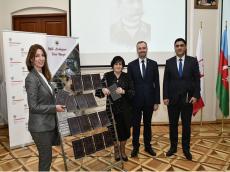|
|
TODAY.AZ / Arts & Entertainment
Book about Polish inventor presented at National History Museum
22 February 2024 [13:26] - TODAY.AZ
 Laman Ismayilova
Laman Ismayilova
The National History Museum has hosted a book presentation by Polish inventor and geologist Witold Zglenitski, who made great contributions to the oil and gas sector of Azerbaijan.
Azernews reports that Polish public figure Professor Andrzej Jan Khodubski is the author of the book "Polish Nobel", which was jointly organised by the Polish Embassy in Azerbaijan and the National History Museum.
The museum director, academician Naila Valikhanli, who spoke at the ceremony, highly appreciated the publication of the book.
The Polish Ambassador to Azerbaijan, Rafal Poborski, emphasised the importance of historical and cultural relations between the states of Azerbaijan and Poland.
Samir Sattarov, the translator of the book, gave a lecture about the life and achievements of V. Zglenitsky.
"Witold Zglenitski graduated from the Faculty of Mathematics and Physics of the Warsaw School of Economics and the Mining Institute in St. Petersburg. At first, he worked as an engineer in Poland, but a significant part of his life is connected to Baku. He worked in Baku from 1891 until his death. V. Zglenitsky, engaged in the modernization of oil extraction methods, put forward the idea of extracting it from the bottom of the sea. He developed not only the concept of the drilling platform but also a number of inventions to facilitate drilling - devices for measuring the curvature of oil wells and technical solutions that allow drilling shafts to go faster and deeper," Samir Sattarov said.
"V. Zglenitsky was also involved in determining the abundance of hydrocarbon resources in the territory of today's Azerbaijan and at the bottom of the Caspian Sea. He was called "the father of Baku oil ", because his geological activities and inventions greatly contributed to the prosperity of the oil industry in Baku. The public activity of V. Zglenitsky is also worth remembering. For example, he participated in the construction of water facilities in Baku, co-financing the construction of the first Roman Catholic Church. In his will, V. Zglenitsky allocated the income from oil fields to the development of science and charity. The implementation of the provisions of the will was interrupted by the outbreak of the First World War. After the revolution of 1917 in Russia, the fund fulfilling the will of V. Zglenitsky was deprived of the right to exploit the oil fields given to it. "V. Zglenitsky died in Azerbaijan, but his body was taken to Poland and buried in the Wola Kielpinska cemetery," he added.
At the end of the event, newly published books were presented to the guests.
URL: http://www.today.az/news/entertainment/245173.html
 Print version
Print version
Connect with us. Get latest news and updates.
See Also
- 24 February 2026 [12:44]
Baku to host memorial evening in honor of Hajibaba Huseynov - 24 February 2026 [10:21]
MEM?M launches new project 'Dialogue on Art' - 23 February 2026 [18:38]
Folklore Institute holds discussions on scientific-technical activities - 23 February 2026 [13:59]
National Art Museum displays art pieces by People's Artist Davud Kazimov - 22 February 2026 [21:15]
Azerbaijan, Austria foster exchange in music education - 20 February 2026 [18:12]
Philharmonic hosts spectacular concert dedicated to Turkic music - 20 February 2026 [13:04]
Culture Minister congratulates People's Poet Nariman Hasanzadeh - 20 February 2026 [12:28]
National Library marks anniversary of acclaimed poet - 19 February 2026 [14:38]
Culture Minister responds to citizens' appeals in Gakh district - 19 February 2026 [12:57]
Science and Education Ministry, ICESCO explore prospects for cooperation
Most Popular
 Guarantees of peace from Armenia: questions remain
Guarantees of peace from Armenia: questions remain
 Greece working with another 4 European countries to set up migrant deportation hubs outside EU
Greece working with another 4 European countries to set up migrant deportation hubs outside EU
 UNESCO celebrates International Mother Language Day
UNESCO celebrates International Mother Language Day
 Azerbaijani NGOs urge UK parliament to halt “biased” inquiry on Karabakh
Azerbaijani NGOs urge UK parliament to halt “biased” inquiry on Karabakh
 Azerbaijan Defense Ministry releases weekly summary video [VIDEO]
Azerbaijan Defense Ministry releases weekly summary video [VIDEO]
 Turkish Parliament to host event on 34th anniversary of Khojaly Genocide
Turkish Parliament to host event on 34th anniversary of Khojaly Genocide
 Azerbaijani Defense Minister visits Air Force Units
Azerbaijani Defense Minister visits Air Force Units
